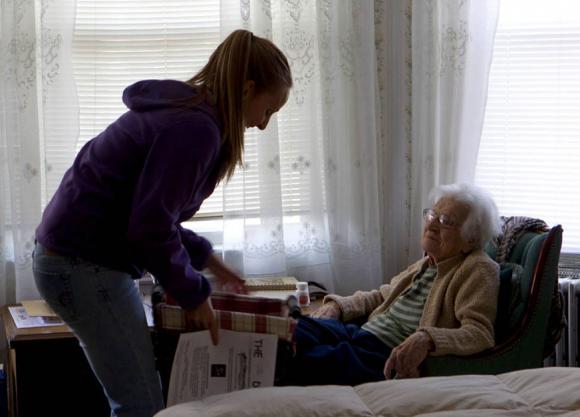PROVIDENCE, R.I. [Brown University] — Kali Thomas, assistant professor (research) of health services, policy, and practice, has shown that meal deliveries can help seniors stay in their homes and save some states money, but in a new report she documents that the service also provides psychological and health benefits, particularly for seniors who live alone.
Meals on Wheels America asked Thomas to conduct a study, with funding from AARP.
“We structured this study as a three-arm randomized, controlled trial to determine what effect home-delivered meals may have for older adults, beyond merely providing essential nutrition,” Thomas said. “What we found is that there were statistically significant differences in health benefits among the three groups, with the highest gains recognized among participants living alone who had face-to-face contact via daily deliveries.”
In the study, hundreds of seniors on the waiting list to receive home-delivered meals in eight sites around the country, including in Rhode Island, received personally delivered fresh meals daily, or weekly bulk deliveries of frozen meals, or simply remained on the waiting list. Seniors in each group answered questions about their physical and mental health at the beginning of the study and again after 15 weeks.
The study identified several benefits. Seniors living alone who received meals showed statistically significant reductions in feelings of isolation, an effect that was greater if they received meals daily rather than weekly. They also felt significantly less lonely, were less worried about staying in their homes, and said they felt safer. The research also found that those receiving meals experienced fewer falls and hospitalizations.
Thomas said that based on her personal experience as a driver and as the family member of a meals recipient, she was not surprised to see benefits she observed anecdotally emerge as significant in a rigorous trial.
“My granny, who lived to be 98 years old while still independent in her home, was grateful for the meals and enjoyed the visits with her meals delivery person,” Thomas said. “It was because of her experience that I began volunteering and had the opportunity to witness firsthand the benefits that Meals on Wheels provides. Our research supports the hypothesis that the delivery, in addition to the meal itself, has numerous positive impacts on clients’ lives.”
Thomas said she plans to submit the data for peer-reviewed journal publication.

